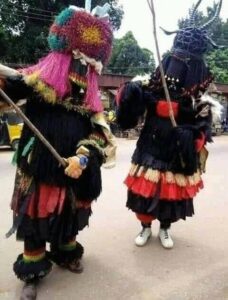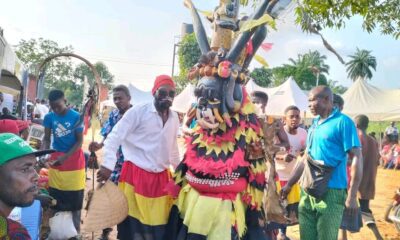New Yam Festival
Afịa-Ọlụ Nnewi: The Vibrant Celebration of Nnewi New Yam Festival
Afịa-Ọlụ Nnewi: The Vibrant Celebration of Nnewi New Yam Festival
In the heart of southeastern Nigeria lies a city renowned for its industrious spirit, rich cultural heritage, and deep-rooted traditions. Nnewi, the second-largest city in Anambra State, proudly celebrates its agricultural roots with the annual Afịa-Ọlụ Nnewi, also known as the Nnewi New Yam Festival. This grand event is a time-honored occasion that brings together the community to express gratitude to the deities, ancestors, and gods for a bountiful harvest. In this article, we will delve into the fascinating details of the Afịa-Ọlụ Nnewi, exploring its history, significance, and the colorful festivities that mark this remarkable occasion

History and Origins
The Nnewi New Yam Festival dates back centuries, tracing its origins to the Igbo people, who are known for their rich cultural practices and agricultural prowess. The festival’s primary objective is to offer thanks to the gods of the land and ancestors for a successful farming season and to seek their blessings for the upcoming planting season. It is held during the peak of the harvest season, usually in the months of August and September.
The term “Afịa-Ọlụ” translates to “yam market” in the Igbo language. Historically, yams were considered a symbol of wealth, abundance, and fertility, making the festival not just a celebration of agriculture but also a showcase of the community’s prosperity. Over time, Afịa-Ọlụ Nnewi has evolved from a simple agricultural event to a multifaceted cultural extravaganza.
Cultural Significance
The Nnewi New Yam Festival holds immense cultural significance for the people of Nnewi. It is not only a time of thanksgiving but also a period to foster unity, social cohesion, and mutual respect within the community. The festival provides a platform for the older generation to pass down traditional knowledge, values, and customs to the younger members of society, ensuring that these important elements of their heritage are preserved.
Rituals and Ceremonies
The festivities of Afịa-Ọlụ Nnewi span several days and are characterized by a series of rituals and ceremonies. The festival begins with the “Iwa ji” (yam cutting) ceremony, where the Igwe (traditional ruler) or a high-ranking elder symbolically cuts the first yam as an offering to the gods and ancestors. This act is believed to pave the way for others to start harvesting their yams.
The “Iri ji Ohuru” (feast of new yams) follows the yam cutting ceremony, during which the community gathers to partake in a grand feast. Traditional delicacies, especially those made from yams, are served, and palm wine flows freely. Cultural performances, dance, and music fill the air, creating a joyous atmosphere that reflects the spirit of the Nnewi people.
Another essential aspect of the festival is the “Ọfọ Nri” or “Igba Nkwu Nnewi” (marriage ceremonies). Many couples choose to tie the knot during this auspicious time, as it is believed that getting married during the Nnewi New Yam Festival brings blessings and prosperity to the union.
Modern Interpretation
While Afịa-Ọlụ Nnewi preserves its traditional roots, it has also embraced modern elements over the years. Today, the festival attracts not only the local community but also visitors from different parts of Nigeria and beyond. It has become an avenue for showcasing Nnewi’s cultural heritage, arts, crafts, and entrepreneurial spirit.
Additionally, the Nnewi New Yam Festival has contributed significantly to the growth of the local economy. It has become a platform for trade and commerce, as many traders from neighboring towns and cities converge in Nnewi during this period, boosting the sale of goods and services.
The Afịa-Ọlụ Nnewi, or Nnewi New Yam Festival, is a vibrant celebration that encapsulates the essence of Nnewi’s rich cultural heritage and agricultural prowess. From its humble origins as a simple yam festival to a grand showcase of the community’s unity and prosperity, the festival remains a cherished occasion for the people of Nnewi. As this grand event continues to evolve and adapt to the changing times, it stands as a testament to the resilience of the Nnewi people and their commitment to preserving their cultural identity for generations to come.





































